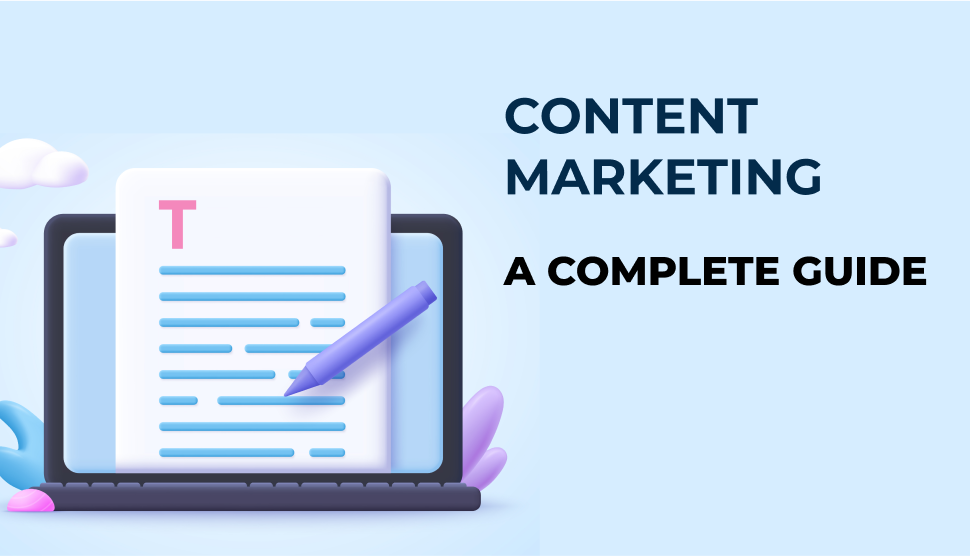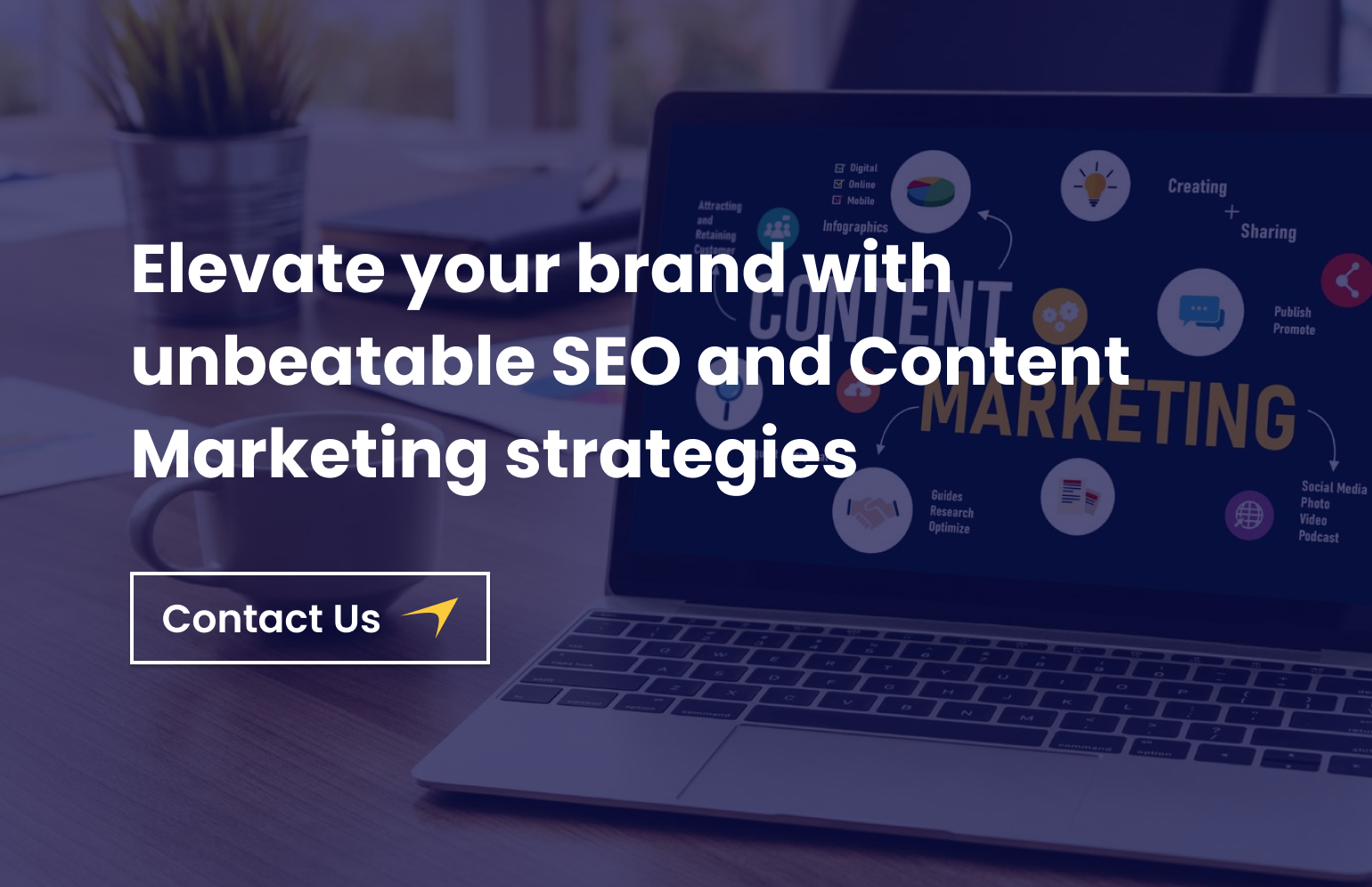The Ultimate Guide to Content Marketing in 2024
Content Marketing | 5 mins read

Once upon a time, marketing was all about creating a catchy slogan, designing a beautiful logo, and paying for advertising space in the right places. But with the advent of the internet and the rise of social media, traditional marketing tactics are no longer enough.
Today, consumers are bombarded with an overwhelming amount of information, ads, and sales pitches every day. To stand out from the crowd and capture the attention of potential customers, businesses need to create content that provides real value and establishes a genuine connection.
Enter Content Marketing!
At its core, content marketing is all about creating and sharing relevant, informative, and engaging content with your target audience. Whether it's blog posts, videos, social media updates, podcasts, or something else entirely, the goal is to establish yourself as a trusted source of information and build a relationship with your audience.
For instance, edge CRM, a simple yet powerful CRM tool quadrupled its organic web traffic with the help of an effective and consistent content marketing strategy. From well-researched and informative articles to sales interviews of veterans to a quirky and creative social media strategy, edge CRM executed everything to perfection and reaped the benefits of content marketing.
Do you also want to boost the revenue of your organization? Then get in touch with the 12Grids team!
Coming back to the article.
Looking at the graph, you might be convinced about the positive effects of content marketing. Do you want to learn the nitty gritty involved in content marketing? Then stay tuned.
What Is Meant By Content Marketing?
Content marketing is a form of marketing focused on creating, publishing, and distributing content for a targeted audience online. It is often used by businesses to achieve various goals such as attracting attention and generating leads, expanding their customer base, generating or increasing online sales, increasing brand awareness or credibility, and engaging an online community of users.
Content marketing attracts new customers by creating and sharing valuable free content. It helps companies create sustainable brand loyalty, provides valuable information to consumers, and creates a willingness to purchase products from the company in the future.
What Are The Types Of Content Involved In Content Marketing?
An effective content marketing strategy involves various types of content pieces. Some of them include:
- Blog posts
- Infographics
- Videos
- eBooks
- Case studies
- Checklists
- Testimonials and reviews
- Influencer marketing
- Guides and how-tos
- Memes
Why Is Content Marketing Important?
Marketing through content leads to business growth. Having content on your site gives people reasons to visit, learn from, and become customers.
Content marketing is important for several reasons:
a) Building brand awareness: Content marketing allows businesses to create valuable and informative content that helps their target audience solve problems, answer questions, and address their needs. This can help build trust and establish the brand as a thought leader in its industry.
b) Lead generation: By creating useful and engaging content, businesses can attract potential customers and encourage them to provide their contact information in exchange for access to more valuable content.
c) Search engine optimization: Well-written and informative content can improve a website's search engine ranking, making it easier for potential customers to find the business online.
d) Cost-effective: Compared to traditional advertising methods, content marketing can be more cost-effective and provide a higher return on investment over time.
e) Long-term benefits: Unlike traditional advertising methods with a short shelf life, high-quality content can continue attracting and engaging potential customers for months or even years after it is published.
Read This: Top Content Marketing Tools You Must Know About In 2024
What Are The Benefits Of Having A Content Marketing Strategy?
Having a content marketing strategy has lots of benefits. From having consistent web traffic to improving your brand reputation, it can do a lot of wonders for your brand. Some of them include:
1. Increased brand visibility — By creating and distributing valuable content, businesses can increase their brand's visibility and reach a wider audience. When businesses produce high-quality content, it can be shared across social media platforms, email, and other digital channels, which can help increase their brand's reach and visibility.
2. Better engagement with customers — Content marketing allows businesses to connect with their customers meaningfully by providing valuable information and insights that address their needs and interests. By understanding their customers' pain points and providing solutions or valuable information, businesses can foster better engagement and build stronger relationships with their customers.
3. Improved brand reputation — By providing helpful and informative content, businesses can establish themselves as thought leaders in their industry and improve their brand's reputation. When businesses produce high-quality content that is relevant and useful, it can establish them as authorities in their industry and improve their reputation among potential customers.
4. Increased website traffic — High-quality content can attract more visitors, improve search engine rankings, and drive more traffic to the business's website. When businesses create content that is optimized for search engines and includes relevant keywords, it can help improve their website's search engine rankings and attract more organic traffic to their site.
5. Lead generation — Content marketing can be used to generate leads by offering valuable content in exchange for contact information. By creating lead magnets such as ebooks, whitepapers, and webinars, businesses can offer valuable information that their target audience is seeking in exchange for their contact information, which can then be used for future marketing efforts.
6. Cost-effectiveness — Compared to traditional advertising methods, content marketing can be more cost-effective and provide a higher return on investment over time. While creating high-quality content may take more time and effort, the long-term benefits can provide a higher return on investment than traditional advertising methods such as print ads, billboards, and TV commercials.
7. Long-term benefits — Unlike traditional advertising methods with a short shelf life, high-quality content can continue attracting and engaging potential customers for months or even years after it is published. This can provide long-term benefits for the business by attracting more traffic to its website, improving its search engine rankings, and building its brand's reputation over time.
Also Read: The Ultimate Guide To Winning Content Marketing Funnel For Marketers
Are There Any Cons To A Content Marketing Strategy?
While content marketing offers many benefits, there are also some potential drawbacks or cons to consider:
Time-consuming:
Creating high-quality content that is informative, engaging, and optimized for search engines can be time-consuming. It can take a significant amount of time and resources to develop a content marketing strategy, create content, and promote it across various digital channels.
Requires ongoing effort:
Content marketing is not a one-time effort but a continuous process requiring ongoing effort and investment. To be successful, businesses need to consistently create and distribute high-quality content that meets the needs of their target audience.
Requires expertise:
Creating effective content marketing campaigns requires expertise in several areas, including content creation, SEO, social media marketing, and email marketing. Outsourcing content marketing efforts can be costly for businesses that lack the necessary expertise or resources.
Results can be difficult to measure:
Measuring the effectiveness of content marketing can be challenging, particularly for businesses that lack the necessary tools or expertise. It can be difficult to determine how much content marketing impacts lead generation, customer engagement, and other key metrics.
Competition is high:
With so many businesses using content marketing, it can be challenging to stand out from the crowd and create content that truly resonates with the target audience.
Limited reach:
While content marketing can effectively reach a broad audience, it may be less effective for reaching a niche or highly specialized audience. In these cases, more targeted advertising or marketing efforts may be required.
Overall, while there are some cons to content marketing the benefits often outweigh the potential drawbacks. With careful planning and execution, businesses can create effective content marketing campaigns that help them reach and engage their target audience and achieve their marketing goals.
How To Create An Effective Content Marketing Strategy That Will Bring Instant Results?
Creating an effective content marketing strategy that delivers instant results can be challenging, but here are some steps you can follow to increase your chances of success:
Define your target audience:
The first step in creating an effective content marketing strategy is to define your target audience. Who are you trying to reach with your content, and what are their needs, interests, and pain points? Creating buyer personas can help you better understand your target audience and develop content that resonates with them.
Set clear goals and objectives:
What do you want to achieve with your content marketing strategy? Are you looking to increase website traffic, generate leads, or improve customer engagement? Set clear, measurable goals and objectives for your content marketing efforts to help guide your strategy.
Identify content topics and formats:
Based on your target audience and marketing goals, identify topics and formats that will resonate with your audience. Consider creating a content calendar that outlines the types of content you will create and when it will be published.
Develop high-quality content:
To see instant results from your content marketing efforts, you must create high-quality content that is engaging, informative, and optimized for search engines. Consider using a mix of formats, such as blog posts, videos, infographics, and social media posts, to appeal to different audiences.
Promote your content:
Creating high-quality content is only part of the equation. To see instant results, you need to promote your content across multiple channels, such as social media, email, and paid advertising. Consider using social media advertising to boost the reach of your content and drive more traffic to your website.
Measure and adjust your strategy:
To ensure that your content marketing strategy delivers the desired results, you need to track your progress and make adjustments as needed. Use analytics tools to monitor key metrics, such as website traffic, lead generation, and customer engagement, and adjust your strategy accordingly.
Remember that content marketing is a long-term strategy, and while you may see some instant results, it takes time to build momentum and see significant results.
By following these steps and consistently creating high-quality content that resonates with your target audience, you can build a successful content marketing strategy that delivers long-term results.
Also Read This: What Is AI In Content Marketing? What Are Its Benefits & Challenges? Explained In Detail
Final Thoughts
Content marketing builds customer awareness, generates leads, and increases conversions. With the advancement of the digital age, content has become an essential part of any marketing strategy. There will always be strategies that generate quick, short-term returns, but content marketing can increase your business's effectiveness for years to come. A well-executed content marketing campaign can save your digital marketing efforts.





